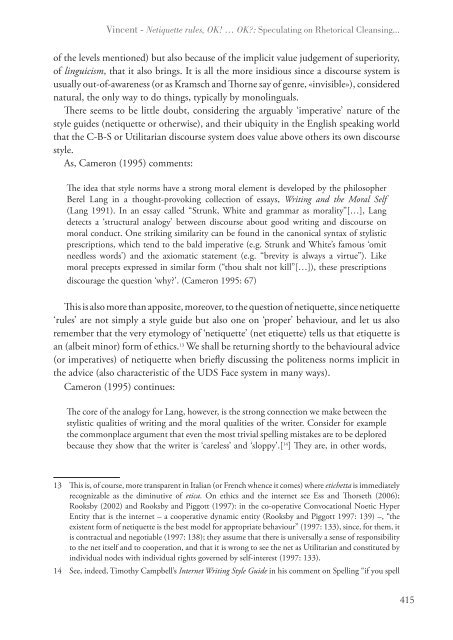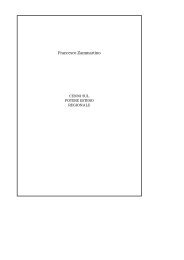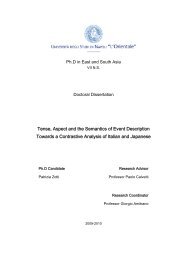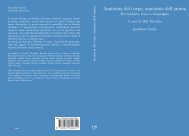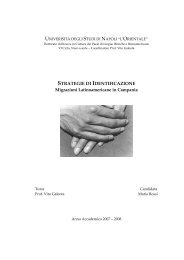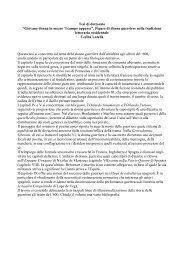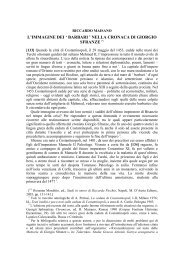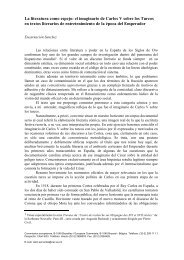Threads in the Complex Fabric of LanguageFor Scollon and Scollon, discourse systems 10 (become ideological systems, moreover,when they are conceived as superior to others:the concept of ideology arises when a discourse system, such as the Utilitarian one, comesto assert itself as a complete communicative system. That is, it become ideological whenit denies or devalues other forms of discourse, or communication. (Scollon and Scollon1995: 119)Scollon and Scollon’s (1995: 98ff.) account of what they dub the Utilitarian DiscourseSystem (UDS) shows that it assumes clarity, brevity, sincerity (C-B-S) 11 as the best wayof communicating in its preferred forms of discourse. They also trace the history ofC-B-S to (most likely) the XVII century and the Royal Society as the preferred styletaken on “quite self-consciously” for scientific deliberations (1995: 99). The ethos, isindeed, expressed in Wilkins (1668: B1 recto, in his pursuit of the Real Character and aPhilosophical Language; see also Eco 1993), and is that which is to some extent, essentiallybehind the Plain English movement (Gowers 1954). Cameron (1995) also traces thesesimilarities historically and among modern authors (chief among them George Orwell1949) and in publishers’ house-style guides and professional editorial practice.Lakoff and Johnson (1980: 186ff., and 1999: 118ff.) and Lakoff (1987: 294ff.),make similar points regarding value judgements, when they critique, for example, theobjectivist ‘myth’ 12 as pernicious or ‘insidious’, since it presupposes its own absolutesuperiority and thus, for example, that speaking directly is better than indirectly, thatsomehow there is something wrong with people who use words which do not directlyand literally reflect ‘reality’ or their thoughts.Cultural or linguistic domination by a particular source language/culture may be seenthus as insidious not simply because of the threat to other languages/cultures (on any10 For how Scollon and Scollon conceive a ‘discourse system’ as constituted by four elements (forms ofdiscourse, socialization, ideology, and face systems), each mutually influencing the others, (see 1995:96-97.11 They define the six main characteristics of the forms of discourse as preferred within the UDS, briefly,as anti-rhetorical, positivist-empirical, deductive, individualistic, egalitarian (only for members of theUDS see p. 117), and public. “These forms have become the preferred ones for the expression of theideology of the [UDS] system […]. Naturally, not all of the characteristics […] will be found to thesame extent in each of the forms one might analyze. These are the ideals for discourse by which thesystem conveys its ideology, and they will be found to a greater or lesser extent in most instances ofUtilitarian discourse.” (Scollon and Scollon 1995: 107). It may be worth pointing out, for the sakeof precision, that the C-B-S style is not a “system of discourse” in their terms; “we would say that itrepresents the style of the preferred forms of discourse within a larger system which we will call theUtilitarian discourse system.” (Scollon and Scollon 1995: 99).12 They also argue that epistemological, linguistic, sociological theories, etc. may be seen as so manydifferent competing local folk theories, ideologies, or ‘myths’ (Lakoff and Johnson 1999: 118ff.).414
Vincent - <strong>Netiquette</strong> <strong>rules</strong>, <strong>OK</strong>! … <strong>OK</strong>?: Speculating on Rhetorical Cleansing...of the levels mentioned) but also because of the implicit value judgement of superiority,of linguicism, that it also brings. It is all the more insidious since a discourse system isusually out-of-awareness (or as Kramsch and Thorne say of genre, «invisible»), considerednatural, the only way to do things, typically by monolinguals.There seems to be little doubt, considering the arguably ‘imperative’ nature of thestyle guides (netiquette or otherwise), and their ubiquity in the English speaking worldthat the C-B-S or Utilitarian discourse system does value above others its own discoursestyle.As, Cameron (1995) comments:The idea that style norms have a strong moral element is developed by the philosopherBerel Lang in a thought-provoking collection of essays, Writing and the Moral Self(Lang 1991). In an essay called “Strunk, White and grammar as morality”[…], Langdetects a ‘structural analogy’ between discourse about good writing and discourse onmoral conduct. One striking similarity can be found in the canonical syntax of stylisticprescriptions, which tend to the bald imperative (e.g. Strunk and White’s famous ‘omitneedless words’) and the axiomatic statement (e.g. “brevity is always a virtue”). Likemoral precepts expressed in similar form (“thou shalt not kill”[…]), these prescriptionsdiscourage the question ‘why?’. (Cameron 1995: 67)This is also more than apposite, moreover, to the question of netiquette, since netiquette‘<strong>rules</strong>’ are not simply a style guide but also one on ‘proper’ behaviour, and let us alsoremember that the very etymology of ‘netiquette’ (net etiquette) tells us that etiquette isan (albeit minor) form of ethics. 13 We shall be returning shortly to the behavioural advice(or imperatives) of netiquette when briefly discussing the politeness norms implicit inthe advice (also characteristic of the UDS Face system in many ways).Cameron (1995) continues:The core of the analogy for Lang, however, is the strong connection we make between thestylistic qualities of writing and the moral qualities of the writer. Consider for examplethe commonplace argument that even the most trivial spelling mistakes are to be deploredbecause they show that the writer is ‘careless’ and ‘sloppy’.[ 14 ] They are, in other words,13 This is, of course, more transparent in Italian (or French whence it comes) where etichetta is immediatelyrecognizable as the diminutive of etica. On ethics and the internet see Ess and Thorseth (2006);Rooksby (2002) and Rooksby and Piggott (1997): in the co-operative Convocational Noetic HyperEntity that is the internet – a cooperative dynamic entity (Rooksby and Piggott 1997: 139) –, “theexistent form of netiquette is the best model for appropriate behaviour” (1997: 133), since, for them, itis contractual and negotiable (1997: 138); they assume that there is universally a sense of responsibilityto the net itself and to cooperation, and that it is wrong to see the net as Utilitarian and constituted byindividual nodes with individual rights governed by self-interest (1997: 133).14 See, indeed, Timothy Campbell’s Internet Writing Style Guide in his comment on Spelling “if you spell415
- Page 1: Netiquette rules, OK! … OK?: spec
- Page 9 and 10: Vincent - Netiquette rules, OK! …
- Page 11 and 12: Vincent - Netiquette rules, OK! …
- Page 13 and 14: Vincent - Netiquette rules, OK! …
- Page 15 and 16: Vincent - Netiquette rules, OK! …
- Page 17 and 18: Vincent - Netiquette rules, OK! …
- Page 19 and 20: Vincent - Netiquette rules, OK! …
- Page 21 and 22: Vincent - Netiquette rules, OK! …
- Page 23 and 24: Vincent - Netiquette rules, OK! …
- Page 25 and 26: Vincent - Netiquette rules, OK! …
- Page 27 and 28: Vincent - Netiquette rules, OK! …
- Page 29 and 30: Vincent - Netiquette rules, OK! …
- Page 31 and 32: Vincent - Netiquette rules, OK! …
- Page 33 and 34: Vincent - Netiquette rules, OK! …
- Page 35: Vincent - Netiquette rules, OK! …


